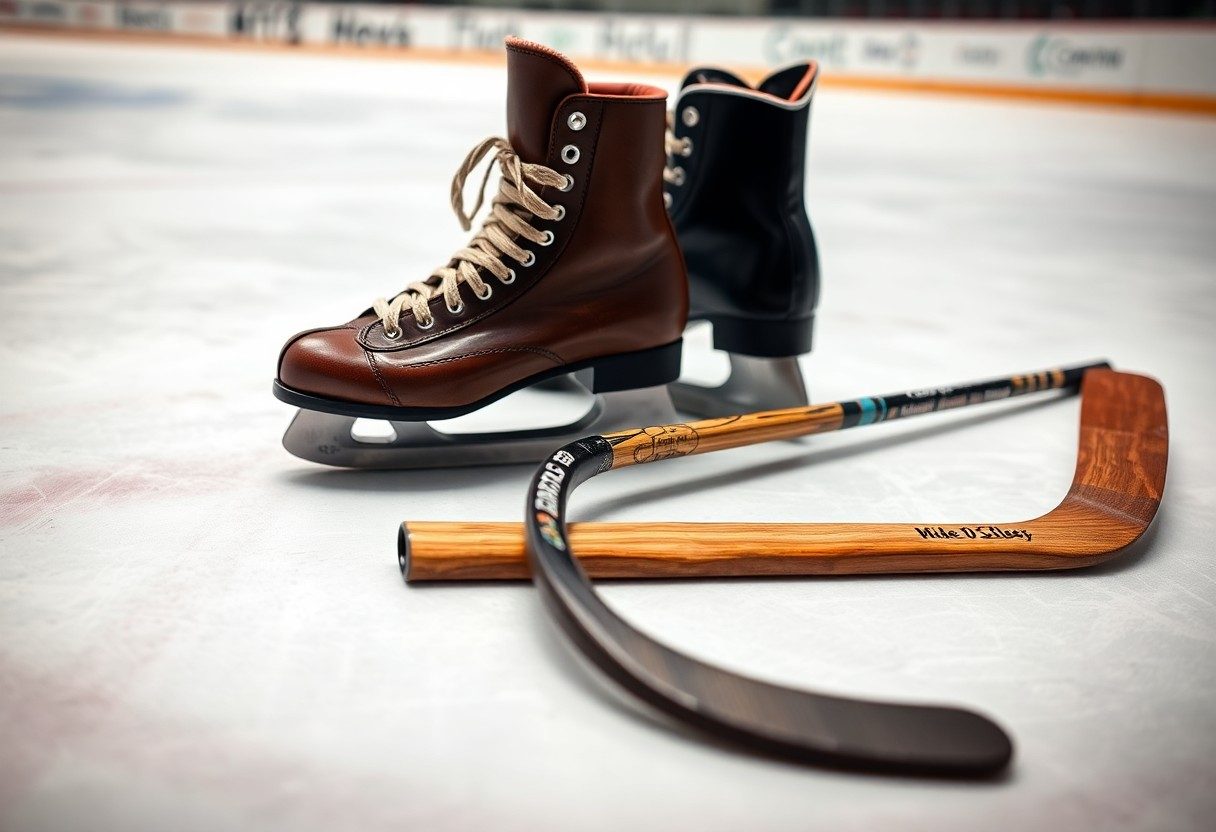Stars on the ice often have hidden talents off the rink, and for many hockey players, poker is a favorite pastime. You might be surprised to discover how some of your favorite hockey icons trade their skates for a deck of cards, showcasing strategic thinking and competitive spirit. In this guide, you’ll examine into the fascinating world of hockey superstars who enjoy the thrill of poker, exploring their journeys and the skills they employ both in the rink and at the card table. Get ready to learn how these athletes channel their competitive edge outside of the game!
Types of Poker Played by Hockey Stars
Before stepping into the poker world, hockey stars often explore different styles of play. Below are some popular types of poker they enjoy:
| Texas Hold’em | Omaha |
| Seven Card Stud | Razz |
| Pineapple | Crazy Pineapple |
| Five Card Draw | Triple Draw Lowball |
| Chinese Poker | Short Deck Hold’em |
After exploring these variations, you may find your preference aligns with the thrilling strategies of a particular game.
Texas Hold’em
Texas Hold’em is the cornerstone of poker enjoyed by many hockey stars. This popular game involves players receiving two hole cards and five community cards, offering numerous betting rounds. You will need a good grasp of strategy and probability, making it both challenging and engaging.
Omaha
To enhance your poker experience, Omaha offers a twist that many enthusiasts find appealing. In this game, you receive four hole cards instead of two, leading to more potential combinations and exciting gameplay.
Understanding Omaha requires you to think differently compared to Texas Hold’em. You must use exactly two of your hole cards in combination with three of the five community cards to create your hand. This added complexity increases the number of possible hands and strategies, giving you ample opportunities to outsmart your opponents. As you investigate into Omaha, you’ll discover that your hand selection and reading of opponents become significantly more critical.
Tips for Transitioning from Ice to Poker
One of the most exciting aspects of making the switch from the ice rink to the poker table is leveraging some of your existing skills. Here are a few tips to help you with that transition:
- Practice patience and discipline.
- Develop your reading skills for opponent behavior.
- Utilize your analytical skills to assess risk and reward.
- Stay focused and avoid distractions during play.
Recognizing how your background in hockey can aid your poker journey will give you a solid foundation for success.
Understanding the Game
Transitioning to poker involves more than just grasping the rules; it’s about understanding the nuances of the game. Take the time to learn about hand rankings, betting structures, and poker etiquette. Familiarize yourself with different variants such as Texas Hold’em and Omaha to find which one suits you best. As you refine your skills, practice through online platforms or local games to enhance your strategic thinking and decision-making abilities.
Mental Strategies
If you want to excel in poker, developing effective mental strategies is vital. This means honing your mindset to adapt to the highs and lows of the game while maintaining focus and composure.
With each hand dealt, the ability to manage your emotions is vital. Establish a strong mental game by practicing mindfulness techniques, setting realistic expectations, and developing a resilient attitude towards losses. Use your experiences from hockey to stay motivated and disciplined, cultivating a mindset where each game is an opportunity to learn and improve.

Step-by-Step Guide to Getting Started in Poker
Now that you’ve decided to investigate the world of poker, follow these simple steps to enhance your gameplay and understanding.
| Steps | Description |
|---|---|
| 1. Learn the Rules | Familiarize yourself with poker hand rankings and basic rules. |
| 2. Practice Online | Use free poker games to hone your skills without any risk. |
| 3. Join a Community | Engage with other players for tips and strategies. |
| 4. Manage Your Bankroll | Establish a strict budget for your poker play. |
| 5. Play Regularly | Consistent practice will improve your strategy and skills. |
Learning the Basics
Assuming you are new to poker, it’s vital to grasp the foundational elements such as hand rankings and betting structures. Dive into various game types like Texas Hold’em or Omaha to find what suits you best, as familiarity with these aspects will greatly enhance your confidence during gameplay.
Finding the Right Platform
Getting started means choosing the right platform where you can play poker comfortably and conveniently. Look for sites that cater to your skill level and offer user-friendly interfaces.
Plus, consider platforms that provide various stakes and game types, ensuring you have options as you progress. Many reputable sites also offer bonuses and promotions for new players, allowing you to explore poker without a substantial financial commitment. Make sure to check the site’s security features and player reviews to guarantee a safe and enjoyable experience.
Factors Influencing Success in Poker
Unlike other games, poker requires a unique combination of skills and strategies to achieve lasting success. To excel at the tables, consider the following factors:
- Your understanding of game mechanics
- Your ability to read opponents
- Your proficiency in probability and odds
- Your emotional resilience and discipline
- Your familiarity with various poker strategies
Assume that leveraging these factors can significantly enhance your poker game and lead to consistent success.
Skill vs. Luck
Poker is a blend of skill and luck, where your decisions greatly impact the outcome. While luck plays a role in short-term results, developing your skills can lead to a higher likelihood of winning over time. Understanding opponents, calculating odds, and selecting the right strategies are skills that can be mastered with practice, making skill a more dependable factor in the long run.
Bankroll Management
Assuming that you want to play poker seriously, effective bankroll management is important. This involves setting aside a specific amount of money for your poker activities and understanding how to allocate it wisely across different games and stakes.
It’s vital to establish a budget that reflects your financial situation and stick to it. Maintaining a proper bankroll allows you to withstand the fluctuations of the game while preventing you from chasing losses. Set clear limits for how much you are willing to spend, and never use money allocated for important expenses. By doing so, you ensure that your poker journey remains enjoyable and financially sustainable, enabling you to focus on improving your skills without excessive risk to your finances.
Pros and Cons of Poker for Athletes
After considering the various aspects of poker, it’s imperative to weigh its pros and cons for athletes. Engaging in poker can offer both benefits and potential drawbacks that you should be aware of.
| Pros | Cons |
|---|---|
| Enhances strategic thinking | Risk of addiction |
| Improves concentration | Potential for financial loss |
| Fosters social connections | Can distract from training |
| Develops resilience | May affect mental health |
| Encourages patience and discipline | Time-consuming |
Benefits of Playing
Pros of engaging in poker include enhancing your strategic thinking abilities, as the game requires careful planning and analysis of opponents. Additionally, it can vastly improve your concentration, crucial for both poker and sports. Playing poker can also help you foster social connections, allowing you to bond with teammates and fellow athletes. Moreover, the game develops resilience, teaching you how to cope with wins and losses. Lastly, poker encourages patience and discipline, traits that undoubtedly benefit your athletic performance.
Potential Downsides
Some potential downsides of playing poker include the risk of addiction, which can be particularly concerning for athletes. The adrenaline involved in both sports and poker might lead to excessive engagement, distracting you from imperative training commitments and performance. Additionally, the potential for financial loss can weigh heavily on your mind, leading to stress and anxiety.
The allure of poker can sometimes overshadow your focus on sports, which may hinder your training and performance levels. Your involvement may also create tension with coaches and teammates who view gambling as a distraction. Furthermore, individuals who struggle with impulse control may find themselves increasingly drawn to poker’s risks, jeopardizing their financial stability and mental well-being. Ultimately, understanding these potential downsides is vital for maintaining a healthy balance between poker and your athletic career.
Famous Hockey Players Who Excel at Poker
For many hockey players, the thrill of competition extends beyond the rink to the felt of a poker table. Some of the most iconic names in hockey have embraced this game of strategy and chance, showcasing their skills in high-stakes tournaments and cash games. By melding their on-ice expertise with the complexities of poker, these athletes have proven that their talent for reading opponents and making split-second decisions translates beautifully into their new passion.
Profiles of Key Players
Now, let’s probe the profiles of some key hockey players who have made a name for themselves in the poker world. Players like Phil Esposito and Daniel Briere aren’t just recognized for their Stanley Cup wins; they’ve also demonstrated remarkable skill at the poker table. Their dedication to mastering the game has captivated both hockey fans and poker enthusiasts alike.
Their Journey from Hockey to Poker
Hockey players transitioning into the poker scene often find that the skills they honed on the ice translate seamlessly into their new pursuit.
This journey typically begins with a love for strategy and competition. Many players, after finishing their careers, seek new challenges that mirror the thrill of sports. The mental intensity found in poker appeals to former athletes, allowing them to engage in a different kind of competition. With a strong understanding of game theory and the psychology of players, these hockey stars often excel at poker, creating a bridge between their two passions and gaining respect in a field that’s quite different from their original sport.
Final Words
So, as you explore the fascinating intersection of hockey and poker, consider how these sports share elements of strategy and excitement. You’ve now discovered that many hockey stars enjoy this popular card game away from the ice, revealing a different side of their competitive nature. Whether you appreciate their skills on the rink or at the poker table, understanding their passion for both can enhance your enjoyment of their careers. Dive deeper into this unique connection, and you may find new inspiration in both games.













